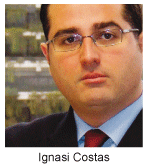Implementing Portugal’s new Digital Agenda – VdA
El anuncio de la nueva Agenda Digital por parte del Gobierno portugués es señal de que la sociedad portuguesa y la economía le están dando a la tecnología un papel cada vez más importante, dice Magda Cocco, que dirige el área de TMT en Vieira de Almeida. Considerando las presiones financieras puestas sobre el país, el plan puede parecer ambicioso, pero ofrece oportunidades significativas en los sectores de telefonía, educación, sanidad y transportes, y posiblemente en la provisión de servicios y tecnología al sector público.
The announcement of a new Digital Agenda by the Portuguese Government signals a renewed focus on the role of technology in Portuguese society and in the national economy, says Magda Cocco who co-leads the Telecoms, Media & Technology (TMT) practice group at Vieira de Almeida.
“In light of the financial pressures currently placed on Portugal, the Government’s plan is clearly ambitious but it nonetheless signals potentially significant new opportunities in the telephony, education, health and transport sectors, as well as in the provision of services and technology to the public sector.”
The announcement builds on Portugal’s 2005 Technology Plan to expand public access to new telephone networks, to open up Government administration and to enable users of public facilities such as schools and hospitals to have better access to information and professional support.
“The most advanced element of the Plan currently is the creation of next generation fixed and mobile telephone networks. The relevant regulatory regimes have already been approved and tenders for five new fixed lines have been awarded so we are now in the licensing and funding phases, with a significant focus on accessing European Union funds,” says Cocco.
Progress has however been slower on the development of new mobile networks, which will likely continue to be dominated by Portugal’s four incumbent licence holders, she believes. “The sense is that even with the opening up of more rural areas, there is not sufficient demand in the market for any new significant market entrants.”
A second strand of the Government’s Plan is to improve efficiency and the ease of public access to the public administration and public services, while a third strand is to improve ”excellence” in education.
“As regards schools and colleges, the intention is to improve the proximity of students to professors through the use of technological tools and platforms, and likewise in the health arena the goal is to place more information online and to enable patients to have better access to files and other forms of assistance.”
A final element of the Government’s Digital Agenda is to improve transport and intelligent mobility networks, including through the promotion of electric cars. Portugal is already piloting a number of projects and testing the functionality of charging points.
Despite such goals, practical considerations nonetheless have to be taken into account in the relative success of such a project or individual schemes. “Not least is the issue of where the finance will come from. The total cost of the Plan is €2.5bn, but only €1.1bn of this is expected to come from public funds,” says Cocco.
The hope therefore is that individual stakeholders will help fill the funding gap but there is an acceptance that such targets may not be easy to achieve, given the relative poor health of the Portuguese economy and the relative lack of interest currently of international investors.
“The success of the public tenders in the expansion of the fixed-line telephony networks demonstrates that sufficient interest is out there for the right kinds of projects, while the Government itself has already committed around €160m. The fixed-line networks are expected to become operational by 2012 and the mobile networks by 2015.”
Such structural developments in addition open up secondary opportunities for content and media providers, while the proposals for technology to help cost-savings in the health sector are also attracting investor interest, says Cocco. But with the budget of many public bodies and education authorities already frozen, it is hard to see where any new project money may come from.
In addition, certain elements of the necessary regulatory frameworks need also to be clarified including in the mobile sector but especially relating to the health and education proposals, she says.
“Without legal certainty there are fewer incentives for potential investors. The Government’s Digital Agenda offers inevitable opportunities but to a certain degree we are still at the stage of trying to understand what exactly is being placed on the table.”












